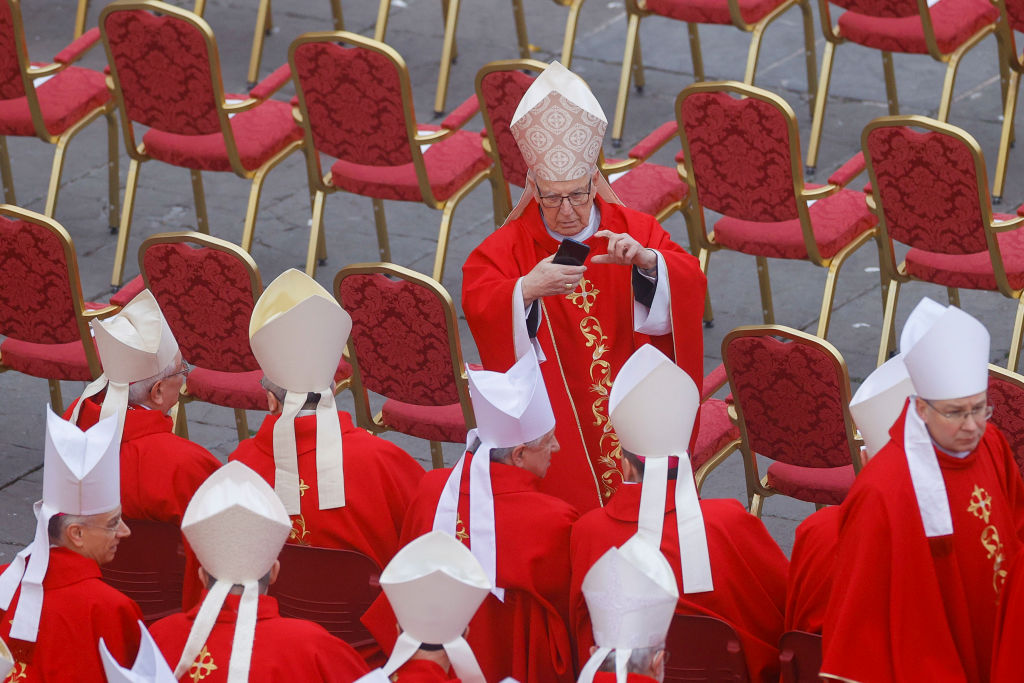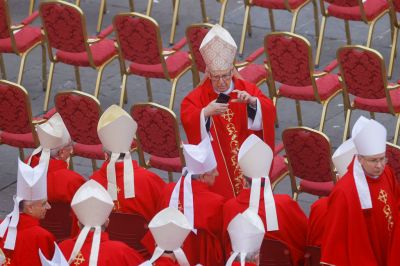“Is the pope Catholic?”
That used to be a punchline, a variation of traditional inquiries about where ursine egestion happens. But it is a real question now for some conservative Catholics, particularly in the United States. The issue has come to a head with the Vatican’s dismissal of Bishop Joseph Strickland, who retains his episcopal title but will no longer govern his Texas diocese after pointed social media criticism of Pope Francis.
The dispute raises cultural, ecclesiastical, and technological questions. To what extent are conservative Catholics in the United States first conservative or first Catholic? How does their cultural situation complicate these rivalrous allegiances? Why the heck is His Excellency blasting off on Twitter?
Traditionally, the Catholic Church has gone through agonies when radical advances in communication technology emerge. The most important figure of the schism that split Christendom in the 16th century wasn’t Martin Luther or John Calvin—it was Johannes Gutenberg, who did his most important work in the middle of the prior century. No printing press, no Reformation.
The printing press sped up the tempo of communication and reduced its cost. Getting the word out required a smaller investment in both time and capital than it once had. This was, of course, a wonderful thing, but there are no unalloyed goods in this fallen world. Only a few years passed between Gutenberg’s first Bible printings and the first use of the press for the mass production of pornography. The press itself is, like a rifle, in itself a morally neutral piece of technology: You can print Coriolanus or you can print Mein Kampf.
Improvements in printing technology led the economic transformation of the literary and journalistic worlds. Books, once expensive treasures, became generally affordable, and the press went from pamphlets that took weeks or months to work their way to readers to the ubiquitous penny press and broadsheet newspapers that, at their apex, printed a half a dozen or more editions throughout the day. Non-print technologies—the telegraph, radio, and satellite—supercharged the power of the press: USA Today long published the boast “VIA SATELLITE” on its front page. As with Gutenberg’s revolutionary invention, later technological developments generally had the same effect on communication. They were faster, cheaper, and a great boon for many institutions.
The Catholic Church is not one of them.
The institutional church is, by design, a slow-moving organization. When those Protestant reformers fired up their printing presses and started making trouble, the Catholic Church responded with a committee meeting that lasted nearly 20 years.
And not to go all doctrinaire Marxist on you, but it is true that the material and economic conditions that influence the means of production of communication have a profound effect upon the political and social character of that communication. The higher the tempo of communication, generally speaking, the lower the level of such qualities as thoughtful reflection, cordiality, and careful editorial attention—qualities that are at least as important in most situations as speed. Almost nothing that has been written on Facebook or Twitter needed to be written at all, much less written urgently, in a moment, without consideration.
Bishops should probably write books and letters rather than tweets and Facebook posts. That would be more in keeping with the character and purpose of the office—and not only the bishops. Congressmen, professors, prominent figures in scientific and medical establishments, would all be better served communicating to a smaller, more refined audience at a slower, more reflective tempo. But the allure of instant feedback from a large readership is very seductive.
It works on prelates the same way it works on senators, which perhaps is one reason Bishop Strickland has so often sounded like Ted Cruz in a cassock, sharing the usual obsessions—vaccines, the purportedly stolen election, etc.—as that one uncle every progressive with a byline apparently has to endure at Thanksgiving dinner. There are prominent figures in conservative Catholic circles, including bitter critics of the current pope, who privately dismiss Bishop Strickland as a publicity hound and a clown.
One of the problems with our political discourse is that while there are 535 members of Congress, nine justices of the Supreme Court, 861 other Article III judges, etc., there is only one president at a time. It is much easier to pay attention to the deeds or one big narrative hero than a whole sprawling unruly gang of them.
The Catholic Church has a similar problem. Popes can be very big men, especially genuinely heroic ones such as the sainted Pope John Paul II. But the president isn’t the country—he isn’t even the government—and the pope isn’t the church. Each is only a temporary chief executive charged with fundamentally administrative duties, with a real but limited power of policymaking. While many people know who the pope is, relatively few can tell you who, for example, Armando Matteo is or why he matters. There are lots of Americans who know the president’s name but not that of their own representative, while practically none in the opposite state. And because tribalism is the real religion of every tribe, the tribes of the Catholic Church fight it out in the papacy the way political partisans fight it out in the presidency. It is an unedifying situation.
If they cannot find a way to peace in the Body of Christ, what hope for the body politic?







Please note that we at The Dispatch hold ourselves, our work, and our commenters to a higher standard than other places on the internet. We welcome comments that foster genuine debate or discussion—including comments critical of us or our work—but responses that include ad hominem attacks on fellow Dispatch members or are intended to stoke fear and anger may be moderated.
With your membership, you only have the ability to comment on The Morning Dispatch articles. Consider upgrading to join the conversation everywhere.